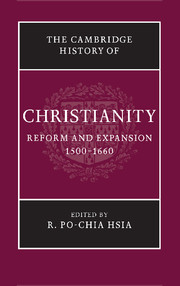Book contents
- Frontmatter
- Part I Luther and the Holy Roman Empire
- Part II The Second Reformation
- Part III Catholic Renewal
- Part IV Resolving Confessional Conflicts
- 13 Peace without concord: religious toleration in theory and practice
- 14 Imposing church and social discipline
- 15 Persecutions and martyrdom
- 16 The Mediterranean Inquisitions of early modern Europe
- 17 Religious colloquies and toleration
- 18 Western Christianity and Eastern Orthodoxy
- Part V Religion, Society, and Culture
- Part VI Christianity and Other Faiths
- Bibliography
- Index
- References
13 - Peace without concord: religious toleration in theory and practice
from Part IV - Resolving Confessional Conflicts
Published online by Cambridge University Press: 28 March 2008
- Frontmatter
- Part I Luther and the Holy Roman Empire
- Part II The Second Reformation
- Part III Catholic Renewal
- Part IV Resolving Confessional Conflicts
- 13 Peace without concord: religious toleration in theory and practice
- 14 Imposing church and social discipline
- 15 Persecutions and martyrdom
- 16 The Mediterranean Inquisitions of early modern Europe
- 17 Religious colloquies and toleration
- 18 Western Christianity and Eastern Orthodoxy
- Part V Religion, Society, and Culture
- Part VI Christianity and Other Faiths
- Bibliography
- Index
- References
Summary
In the seventeenth century René Descartes (1596–1650) defended the philosopher’s right to distinguish between the spheres of faith and reason, claiming practically unlimited intellectual freedom for reason. Where faith owed nothing to reason, being illuminated by divine revelation, reason owed nothing to faith: therefore, philosophy ought to be radically separated from revealed theology. This conviction had direct consequences for the practice of religious toleration, for it meant that the emphasis was shifting from the struggle for or against freedom of religion to a struggle for or against freedom of thought. Descartes claimed the right to think unconstrainedly about fundamental religious concepts and, moreover, to formulate these with equal liberty. In his clash with the Dutch theologian Gisbertus Voetius (1598–1676), who opposed this notion with much fervour, Descartes interpreted the problem of free philosophical discussion not in ideal, but in moral and legal terms. Such liberty should not so much be considered a necessary philosophical condition for discovering hidden truths, but first and foremost a political right guaranteed by the government. Whoever blackened the reputation of an individual infringed this liberty, as Voetius had done when he attacked Descartes — or so the latter argued. Under a political system which guaranteed, at least in theory, equal liberties to every inhabitant of the Republic of the United Provinces, the theologian Voetius was not in a position powerful enough to oppress the philosopher Descartes. For, according to the latter, no theologian was privileged to overrule the magistrates, who were bound to protect philosophers like Descartes against aggression and calumny and, by so doing, were upholding law and order.
- Type
- Chapter
- Information
- The Cambridge History of Christianity , pp. 225 - 243Publisher: Cambridge University PressPrint publication year: 2007



